Kurdistan


Iraqi Prime Minister Mohammed Shia' al-Sudani at the tomb of late Iraqi President Jala Talabani in Sulaimani on November 13, 2024. Photo: PM Sudani's office.
ERBIL, Kurdistan Region - Iraq’s Prime Minister Mohammed Shia’ al-Sudani on Wednesday paid separate visits to the winning parties in the Kurdistan Region’s parliamentary elections and urged to expedite talks to form the new Kurdistan Regional Government (KRG) cabinet, nearly a month after the Region’s elections took place.
Sudani arrived in Erbil on Wednesday on a one-day visit to the Kurdistan Region and was received by Prime Minister Masrour Barzani at Erbil International Airport. He also met with political leaders in the Kurdish capital and then traveled to Sulaimani to continue discussions.
In Erbil, Sudani met with Kurdistan Region President Nechirvan Barzani and talked about the government formation efforts, as well as Baghdad-Erbil relations.
“The meeting discussed the results of the Kurdistan parliamentary elections, the steps taken to form the new cabinet of the Kurdistan Regional Government, Erbil-Baghdad relations, as well as the situation in the country and latest regional developments,” said a statement from the Kurdistan Region Presidency.

President Barzani and Prime Minister Sudani also reiterated the need “to keep the country away from the consequences of regional conflict” with heightened regional tensions against the backdrop of Israel’s wars in Gaza and Lebanon.
Sudani’s meeting with the Kurdish premier “covered shared issues between the federal government and the Kurdistan Region of Iraq, foremost among them the efforts to resume oil exports from the Kurdistan Region of Iraq,” according to a statement from Sudani’s office.
The Iraqi premier also “stressed the necessity of forming a new government in the Kurdistan Region” and offered Baghdad’s assistance in the process, while stressing the importance of maintaining cooperation between the federal government and the KRG.
The KRG said in a statement that both prime ministers "emphasized the importance of the resumption of the Region's oil exports in the nearest future and the removal of obstacles and issues before it in a way that is in the interests of all the citizens of Kurdistan Region and Iraq."

Both leaders agreed that the upcoming nationwide census should be used for the aim of development, while "taking into consideration Kurdistan Region's notes in this regard."
While in Erbil, Sudani visited the Kurdistan Democratic Party (KDP) leader Masoud Barzani.
“In the meeting, discussions were held on Iraq's political situation and the latest developments and dynamics in the region. Emphasis was also placed on taking positive and constructive steps in the relations and coordination between the Kurdistan Regional Government and the Iraqi federal government,” read a statement from Barzani’s office.
During the meeting, Sudani stressed “the importance of expediting the formation of the government and maintaining political stability in the region, which supports the stability of the entire political process in Iraq,” according to his office.
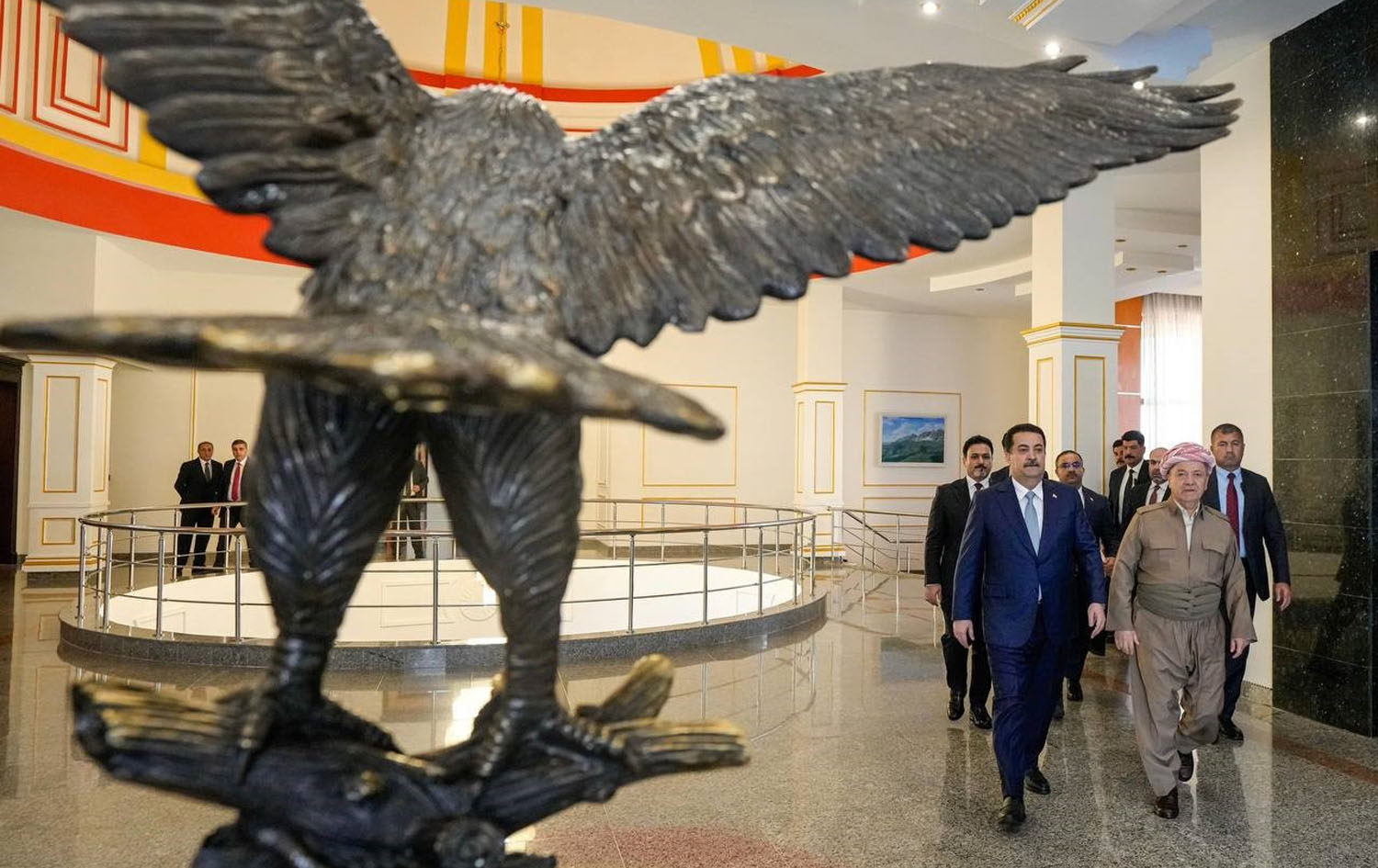
The Iraqi prime minister visited the leader of the Kurdistan Justice Group (Komal) Ali Bapir at the party’s headquarters in Erbil.
“The meeting included discussions on the overall situation in the country, emphasizing the importance of combined efforts to address various challenges and enhance coordination among political forces to achieve shared goals that support Iraq’s stability and security,” according to a statement from Sudani’s office.
Following the elections, Komal was among the parties that did not accept the results, alleging fraud committed during the vote. The party later announced that it will not enter the parliament.
During the meeting with Sudani, Komal leadership reiterated their stance of not participating in the parliament.
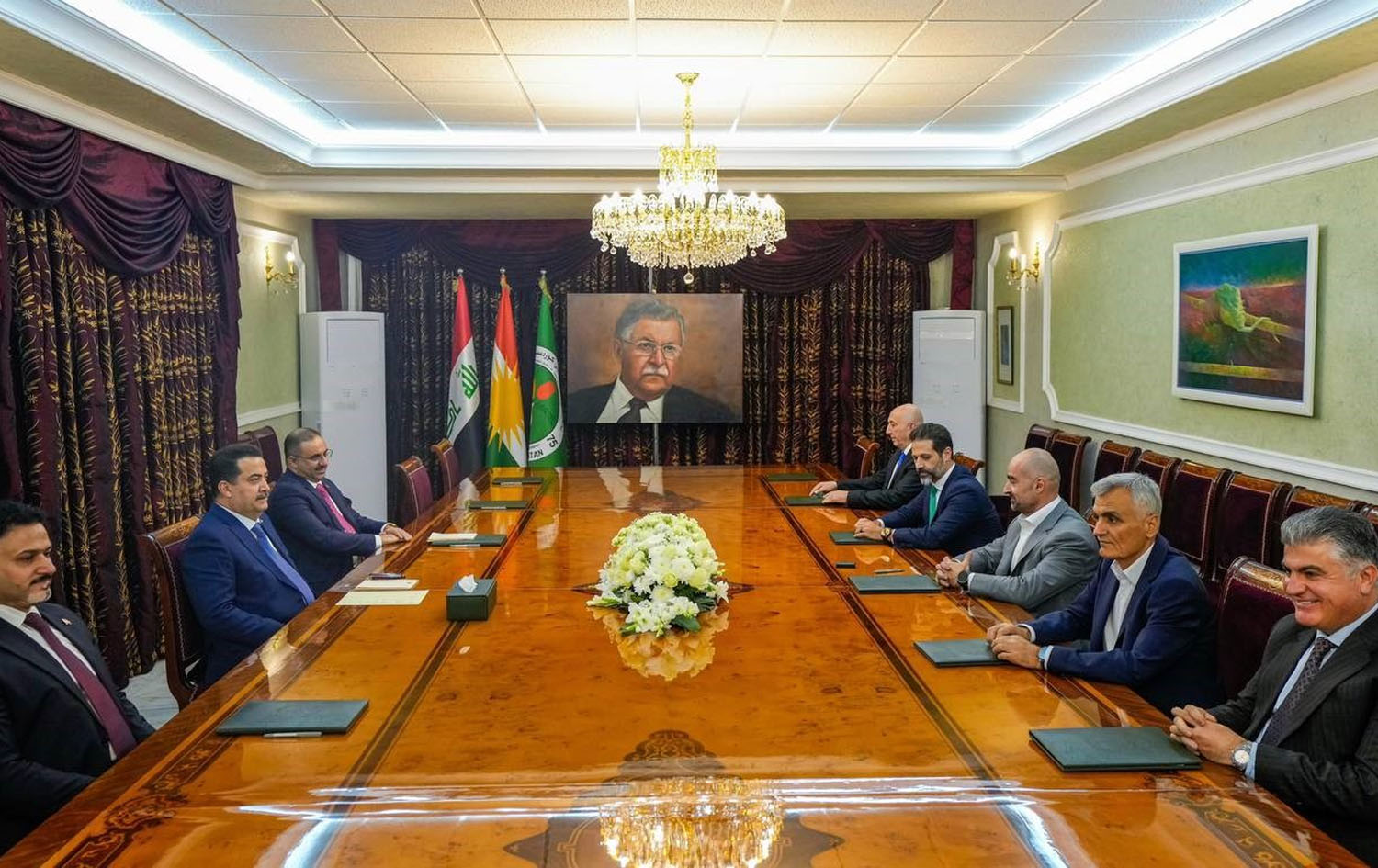
“Kurdistan parliament elections were discussed, we told his excellency that we do not enter such a parliament that was fraudulent, pre-designed, in which we were targeted,” Abdulsattar Majeed, a senior Komal official told journalists after the meeting.
After concluding his meetings in Erbil, Sudani traveled to Sulaimani, where he was received by Patriotic Union of Kurdistan (PUK) leader Bafel Talabani, as well as KRG Deputy Prime Minister Qubad Talabani, and Sulaimani Governor Haval Abubakr at the Sulaimani International Airport.
During his meeting with PUK officials, the two sides discussed topics ranging from the Kurdistan parliament election results to the outstanding Baghdad-Erbil issues.
“The meeting addressed political, economic, and security developments. Both sides emphasized the importance of continued coordination and cooperation between the Kurdistan Region and Iraq to resolve issues based on the constitution, genuine partnership, and political agreements,” Bafel Talabani said on X following the meeting.
Sudani also met with the Region’s largest opposition party, the New Generation Movement leader Shaswar Abdulwahid.
Following the meeting, Abdulwahid told journalists that his party’s project to participate in the next KRG government is either to have the prime minister position or all the ministers of the cabinet.
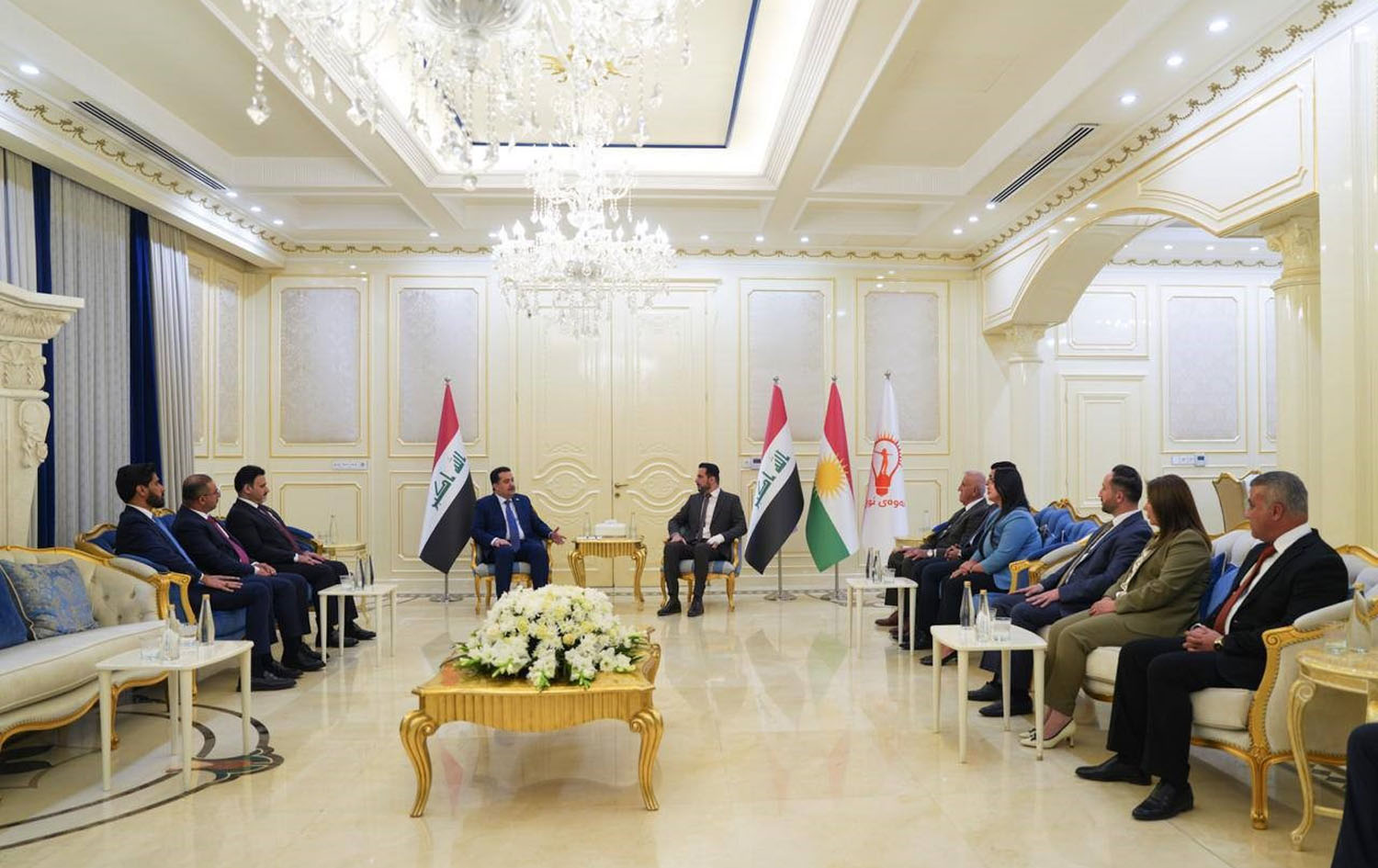
The Iraqi premier later met with the Kurdistan Islamic Union (KIU) leader Salahaddin Bahaddin in the party’s Sulaimani headquarters.
During the meetings, Sudani repeated his call for a speedy formation of a Kurdish cabinet.
For his part, Bahaddin called on Sudani “to take serious action to address the fundamental issues surrounding the salaries of Kurdistan Region employees and to resolve the obstacles that delay salary distribution,” according to a statement from the KIU leader’s office.
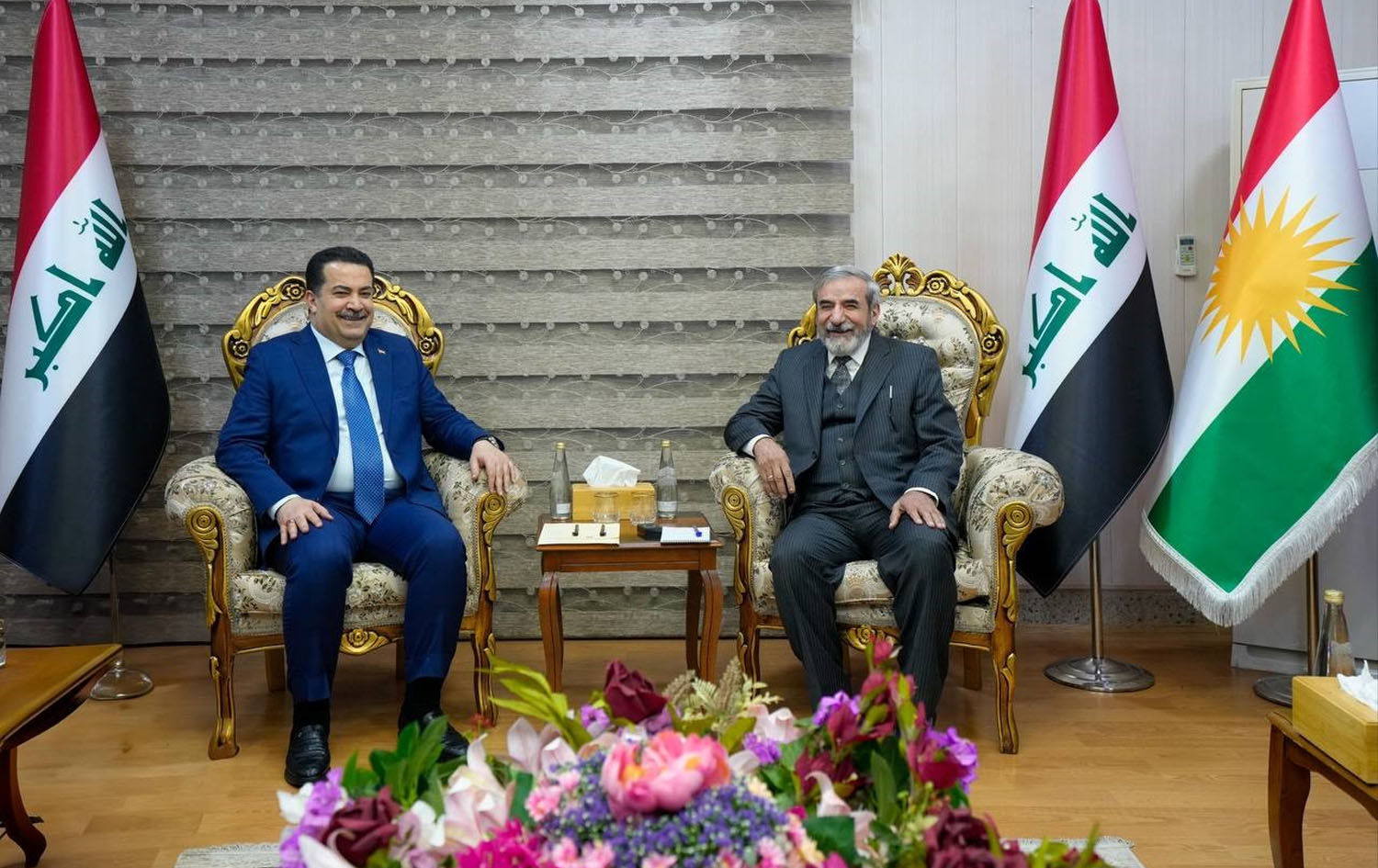
The Iraqi prime minister visited the newly-established National Stance Movement (Halwest) in their Sulaimani headquarters, before concluding his visit.
Sudani “emphasized the importance of fostering a positive environment to strengthen dialogue and understandings among the winning political forces. He urged all parties to contribute to the formation of the new government to fulfill the aspirations of the Kurdistan Region’s citizens in improving their living conditions and meeting their needs,” according to a statement from his office.
Rebwar Karim, a member of Halwest leadership told journalists following the meeting that the party is adamant on being an opposition, in case they enter the parliament.
Karim said that the party is awaiting the outcome of their complaints regarding the election results, before deciding on whether they enter the legislature or not.
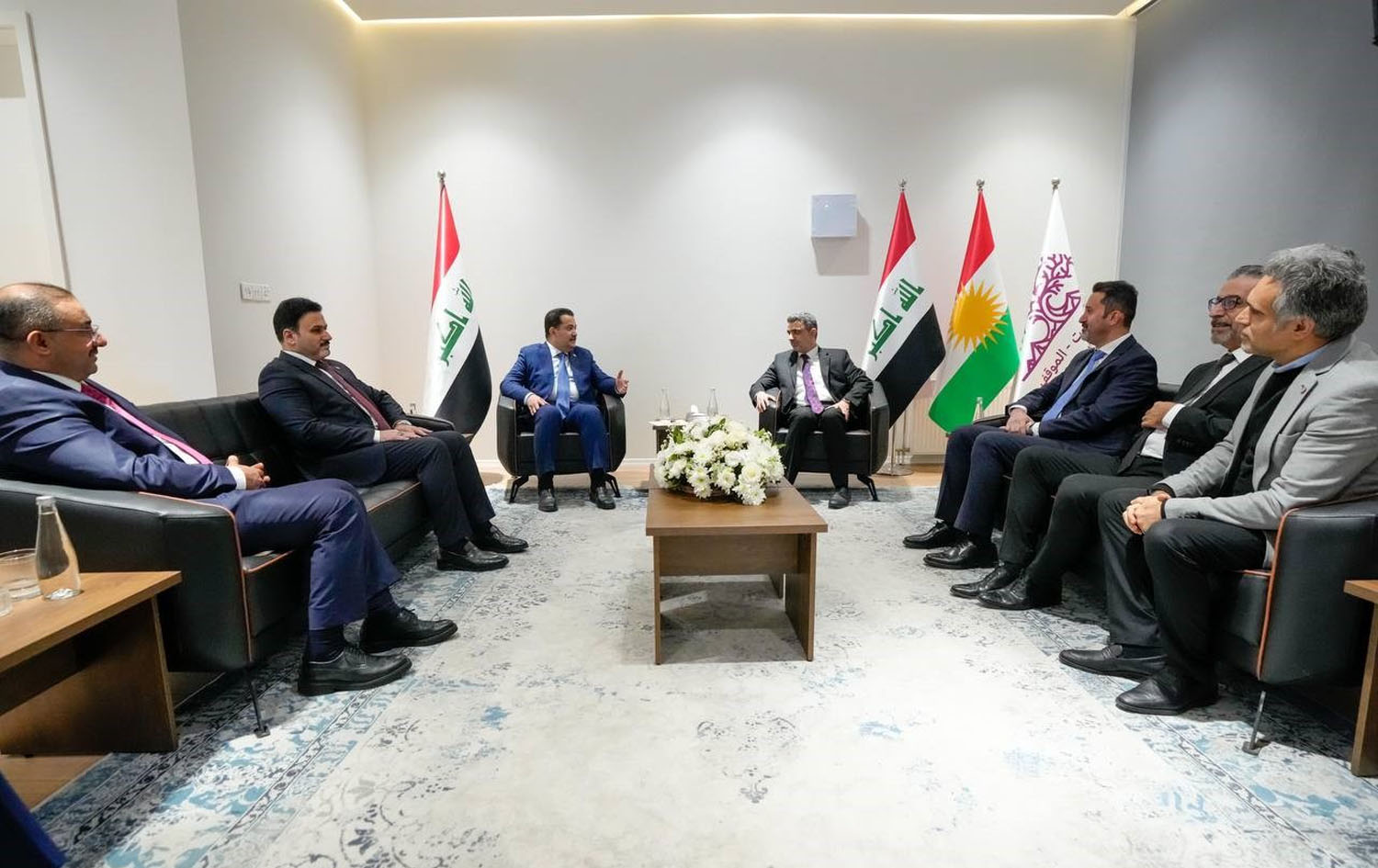
The People’s Front (Baray Gal), a newly formed party formed by Lahur Talabany, said in a statement that they were approached by Sudani’s office for a visit, however, the party’s leader rejected the request.
“Mr Lahur Sheikh Jangi has refused the meeting with an apology due to some previous stances of the prime minister,” read a statement from Talabany’s office.
The Kurdistan Region held its long-overdue parliamentary elections on October 20 after two years of delays. The vote resulted in a consolidation of power for the ruling KDP, which won 39 seats, followed by its government ally but political rival the PUK with 32 seats, and the opposition New Generation Movement with 15 seats scoring third place.
The main Islamist parties - KIU and Komal - took seven and three seats, respectively. Halwest, led by outspoken former lawmaker Ali Hama Saleh, obtained four. Baray Gal got two seats while the Change Movement (Gorran), once a powerful opposition force, took just one seat.
Komal, the KIU, Baray Gal, and Halwest denounced the election results, alleging fraud and voter manipulation, and questioned the reliability of the voting machines.
Despite the finalization of the results in late October, the parties have yet to start formal government formation talks.
Sudani arrived in Erbil on Wednesday on a one-day visit to the Kurdistan Region and was received by Prime Minister Masrour Barzani at Erbil International Airport. He also met with political leaders in the Kurdish capital and then traveled to Sulaimani to continue discussions.
In Erbil, Sudani met with Kurdistan Region President Nechirvan Barzani and talked about the government formation efforts, as well as Baghdad-Erbil relations.
“The meeting discussed the results of the Kurdistan parliamentary elections, the steps taken to form the new cabinet of the Kurdistan Regional Government, Erbil-Baghdad relations, as well as the situation in the country and latest regional developments,” said a statement from the Kurdistan Region Presidency.

President Barzani and Prime Minister Sudani also reiterated the need “to keep the country away from the consequences of regional conflict” with heightened regional tensions against the backdrop of Israel’s wars in Gaza and Lebanon.
Sudani’s meeting with the Kurdish premier “covered shared issues between the federal government and the Kurdistan Region of Iraq, foremost among them the efforts to resume oil exports from the Kurdistan Region of Iraq,” according to a statement from Sudani’s office.
The Iraqi premier also “stressed the necessity of forming a new government in the Kurdistan Region” and offered Baghdad’s assistance in the process, while stressing the importance of maintaining cooperation between the federal government and the KRG.
The KRG said in a statement that both prime ministers "emphasized the importance of the resumption of the Region's oil exports in the nearest future and the removal of obstacles and issues before it in a way that is in the interests of all the citizens of Kurdistan Region and Iraq."

Both leaders agreed that the upcoming nationwide census should be used for the aim of development, while "taking into consideration Kurdistan Region's notes in this regard."
While in Erbil, Sudani visited the Kurdistan Democratic Party (KDP) leader Masoud Barzani.
“In the meeting, discussions were held on Iraq's political situation and the latest developments and dynamics in the region. Emphasis was also placed on taking positive and constructive steps in the relations and coordination between the Kurdistan Regional Government and the Iraqi federal government,” read a statement from Barzani’s office.
During the meeting, Sudani stressed “the importance of expediting the formation of the government and maintaining political stability in the region, which supports the stability of the entire political process in Iraq,” according to his office.

The Iraqi prime minister visited the leader of the Kurdistan Justice Group (Komal) Ali Bapir at the party’s headquarters in Erbil.
“The meeting included discussions on the overall situation in the country, emphasizing the importance of combined efforts to address various challenges and enhance coordination among political forces to achieve shared goals that support Iraq’s stability and security,” according to a statement from Sudani’s office.
Following the elections, Komal was among the parties that did not accept the results, alleging fraud committed during the vote. The party later announced that it will not enter the parliament.
During the meeting with Sudani, Komal leadership reiterated their stance of not participating in the parliament.

“Kurdistan parliament elections were discussed, we told his excellency that we do not enter such a parliament that was fraudulent, pre-designed, in which we were targeted,” Abdulsattar Majeed, a senior Komal official told journalists after the meeting.
After concluding his meetings in Erbil, Sudani traveled to Sulaimani, where he was received by Patriotic Union of Kurdistan (PUK) leader Bafel Talabani, as well as KRG Deputy Prime Minister Qubad Talabani, and Sulaimani Governor Haval Abubakr at the Sulaimani International Airport.
During his meeting with PUK officials, the two sides discussed topics ranging from the Kurdistan parliament election results to the outstanding Baghdad-Erbil issues.
“The meeting addressed political, economic, and security developments. Both sides emphasized the importance of continued coordination and cooperation between the Kurdistan Region and Iraq to resolve issues based on the constitution, genuine partnership, and political agreements,” Bafel Talabani said on X following the meeting.
Sudani also met with the Region’s largest opposition party, the New Generation Movement leader Shaswar Abdulwahid.
Following the meeting, Abdulwahid told journalists that his party’s project to participate in the next KRG government is either to have the prime minister position or all the ministers of the cabinet.

The Iraqi premier later met with the Kurdistan Islamic Union (KIU) leader Salahaddin Bahaddin in the party’s Sulaimani headquarters.
During the meetings, Sudani repeated his call for a speedy formation of a Kurdish cabinet.
For his part, Bahaddin called on Sudani “to take serious action to address the fundamental issues surrounding the salaries of Kurdistan Region employees and to resolve the obstacles that delay salary distribution,” according to a statement from the KIU leader’s office.

The Iraqi prime minister visited the newly-established National Stance Movement (Halwest) in their Sulaimani headquarters, before concluding his visit.
Sudani “emphasized the importance of fostering a positive environment to strengthen dialogue and understandings among the winning political forces. He urged all parties to contribute to the formation of the new government to fulfill the aspirations of the Kurdistan Region’s citizens in improving their living conditions and meeting their needs,” according to a statement from his office.
Rebwar Karim, a member of Halwest leadership told journalists following the meeting that the party is adamant on being an opposition, in case they enter the parliament.
Karim said that the party is awaiting the outcome of their complaints regarding the election results, before deciding on whether they enter the legislature or not.

The People’s Front (Baray Gal), a newly formed party formed by Lahur Talabany, said in a statement that they were approached by Sudani’s office for a visit, however, the party’s leader rejected the request.
“Mr Lahur Sheikh Jangi has refused the meeting with an apology due to some previous stances of the prime minister,” read a statement from Talabany’s office.
The Kurdistan Region held its long-overdue parliamentary elections on October 20 after two years of delays. The vote resulted in a consolidation of power for the ruling KDP, which won 39 seats, followed by its government ally but political rival the PUK with 32 seats, and the opposition New Generation Movement with 15 seats scoring third place.
The main Islamist parties - KIU and Komal - took seven and three seats, respectively. Halwest, led by outspoken former lawmaker Ali Hama Saleh, obtained four. Baray Gal got two seats while the Change Movement (Gorran), once a powerful opposition force, took just one seat.
Komal, the KIU, Baray Gal, and Halwest denounced the election results, alleging fraud and voter manipulation, and questioned the reliability of the voting machines.
Despite the finalization of the results in late October, the parties have yet to start formal government formation talks.









Comments
Rudaw moderates all comments submitted on our website. We welcome comments which are relevant to the article and encourage further discussion about the issues that matter to you. We also welcome constructive criticism about Rudaw.
To be approved for publication, however, your comments must meet our community guidelines.
We will not tolerate the following: profanity, threats, personal attacks, vulgarity, abuse (such as sexism, racism, homophobia or xenophobia), or commercial or personal promotion.
Comments that do not meet our guidelines will be rejected. Comments are not edited – they are either approved or rejected.
Post a comment